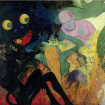
Garden From Emperor Caligula’s Reign Unearthed Near the Vatican
Archaeological excavations near the Vatican have unearthed the remains of an ancient garden that likely belonged to the Roman Emperor Caligula (reigned 37-41 AD). This discovery was made during the construction of a pedestrian piazza intended to connect Castel Sant'Angelo to St. Peter's Basilica and the Via della Conciliazione boulevard, some of the most frequented tourist areas in Rome.
Historically, this area was known for its prestigious imperial residences with grand porticos, promenades, and gardens overlooking the Tiber River. The excavated remains include a travertine wall, the foundations of a colonnaded portico, and a garden, The Italian Ministry of Culture reported.

Remains of tavertine wall, colonnaded portico and gardens found near the Vatican. (Italian Ministry of Culture)
Corroboration with Literary Sources: The Allusion to Caligula
Among the findings was a lead water pipe inscribed with the name of the water supply's owner, who is likely the garden’s proprietor. The evidence suggests Caligula, the son of Germanicus and Agrippina the Elder as the owner. The ministry noted that literary references also seem to corroborate the site's connection to Caligula.
The association of the structure with Caligula stems from the discovery of a lead water pipe (fistula plumbea) uncovered in situ, stamped with “C(ai) Csaris Aug(usti) Germanici” – Caesar Augustus Germanicus.

Lead water pipes stamped with the name Caesar Augustus Germanicus. (Italian Ministry of Culture)
This discovery aligns with the aforementioned ancient literary sources. A passage by Philo of Alexandria (20 BC – 50 AD) describes an event where Caligula receives a diplomatic delegation of Alexandrian Jews following civil strife between the Jewish and Greek communities of Alexandria. Philo’s text describes a large garden overlooking the Tiber, separated by a monumental portico.
The excavation also uncovered a significant series of figurative terracottas, originally used to decorate roofs with unique mythological scenes. These terracottas had been repurposed as sewer covers but were initially likely made for some structure within the garden, reports The Associated Press.
This construction is part of the Vatican’s preparations for the 2025 Jubilee, a holy year anticipated to attract around 32 million pilgrims to Rome. In the lead-up to the Jubilee, numerous long-postponed construction projects have been initiated, including the 79.5 million euro piazza with an underground tunnel to redirect traffic. The project at Piazza Pia is scheduled for completion by December.

Emperor Caligula. (CC BY-SA 3.0)
Caligula: Tyrant or Saint?
Caligula's nickname, which means "little boot," was affectionately given by soldiers during his childhood when he accompanied his father on military campaigns dressed in miniature military gear.
He was assassinated just 4 years into his reign in 41 AD, was unfairly given the tag of a mad ruler, as most of the (few) surviving sources were authored by members of the nobility and senate, long after the events they describe. They portray Caligula as a noble and moderate emperor during the first six months of his rule.
However, he is depicted as becoming increasingly self-indulgent, cruel, sadistic, extravagant, and sexually perverted thereafter, transforming into an insane tyrant who demanded and received worship as a living god, reports The Heritage Daily. He humiliated his Senate and even planned to make his horse Incitatus, who he had initially anointed as a priest, a consul. He reportedly indulged in lavish spending, hosted extravagant games and spectacles, which at this juncture in history was not practiced before by any Roman emperor.
Most modern commentaries seek to explain Caligula's position, personality, and historical context. Many of the allegations against him are dismissed as misunderstandings, exaggerations, mockery, or malicious fantasy.
Caligula's relationship with the Senate deteriorated into outright hostility and open mockery. This tension ultimately led to his assassination by officers of the Praetorian Guard, along with senators and courtiers. In fact, his death was so gory and violent that he was reportedly hacked into bits by his men. His death marked the end of a brief and tumultuous period in Roman history. Caligula was succeeded by his uncle, Claudius, who would allegedly go on to restore stability to the empire.
Top image: Remains of garden structures found in Rome. Inset; Lead water pipes stamped with the name Caesar Augustus Germanicus. Source: Italian Ministry of Culture
By Sahir Pandey
References
Milligan, M. 2024. Portico belonging to Caligula unearthed in Rome . Available at: https://www.heritagedaily.com/2024/07/portico-belonging-to-caligula-unearthed-in-rome/152550.
Zampano, G. 2024. Ruins of ancient garden likely owned by Caligula uncovered near Vatican . Available at: https://abcnews.go.com/International/wireStory/ruins-ancient-garden-owned-emperor-caligula-uncovered-vatican-111678019.















